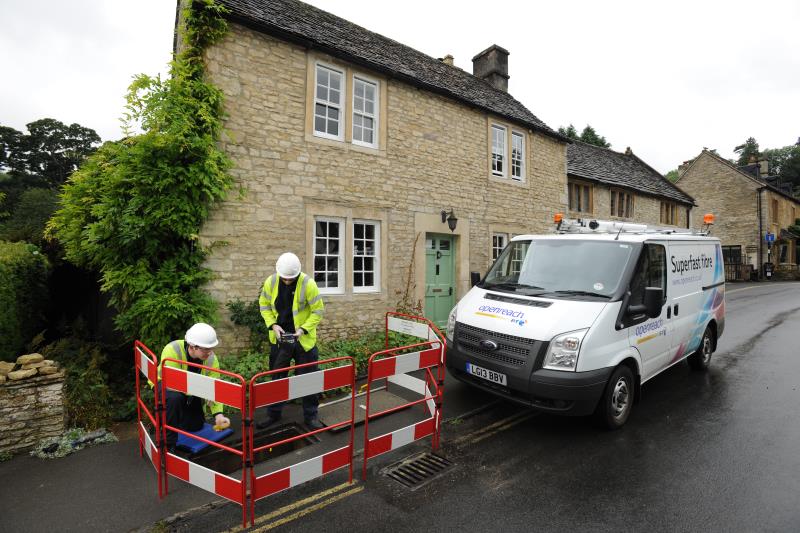Respondents to the survey stressed that rural areas should have access to the same level of digital service and infrastructure as urban areas, including better speed, coverage and reliability. This reinforces the NFU’s call for government to prioritise digital connectivity in rural areas as part of its plan to level up the country.
The findings on broadband speeds indicate welcome progress with fewer members on the slowest connections, and a welcome increase in superfast connections.
However, the 36% of members on superfast broadband compares unfavourably to the 97% reported as the national average by Ofcom.
“Even with the positive increase in access to superfast broadband for over a third of respondents, it is unacceptable that 4 out of 5 farmers do not have reliable mobile signals throughout their farm.”
NFU Vice President David Exwood

NFU Vice President David Exwood said, “In a time when food security is so prevalent on the government’s agenda, we need to produce more of what we do well here. This means being as efficient and productive as possible, and access to the internet is vital for businesses to do this.”
Broadband
Our survey of 814 NFU members showed:
- 48% had the broadband speeds their businesses needed (10% better than last year)
- 18% had the broadband speeds of less than 2 Mbps, down 12% from last year
- 36% had superfast broadband speeds (+24Mbps), up 12% from last year, but other members still report prohibitive costs for installation.
Mobile
Our survey of 814 NFU members showed:
- 50% had acceptable mobile signal (6% better than last year)
- 21% had reliable mobile signals across whole farms – important for safety (4% more than last year)
- 80% of members have access to 4G on their mobiles and 10% have access to 5G. 10% of members have no access to 4G or 5G (4% better than last year).
You can download the full PDF report at: 2022 Digital Technology Survey Results
David Exwood explained that poor mobile connectivity was a safety issue on farm, “Even with the positive increase in access to superfast broadband for over a third of respondents, it is unacceptable that 4 out of 5 farmers do not have reliable mobile signals throughout their farm. Not only does this impact the day-to-day running of rural businesses, but it is dangerous to leave a farmer with no way of communicating in a time of crisis. Ultimately, this lack of access is preventing UK farmers and growers from doing what they do best – producing homegrown, climate-friendly, and affordable food.”
Levelling Up?
Improving connectivity was an important manifesto pledge from the Boris Johnson government as part of its Levelling Up agenda, with an initial aim of bringing gigabit-speed broadband to all UK homes and businesses by 2025.
That figure was downgraded to 85% of the UK in a recent White Paper, with the remaining 15% promised by 2030.
David Exwood went on to say, “Our results show that we need a really concentrated effort from the government and telecommunications industry to reach the most remote areas still without coverage if we want to achieve the Shared Rural Network’s aim to deliver 4G connectivity across the UK by 2025. While the introduction of 5G to some rural areas is encouraging, as it supports the introduction of new technologies and more productive business practices on farm, this year’s survey shows that connectivity is only increasing slowly, and the farming industry is still lagging significantly behind the rest of the country.
“We will continue to campaign for investment in the country’s digital technology infrastructure - which is key to productive farming businesses - on top of our asks for proper training and appropriate schemes for farmers and growers so they can meet their huge potential in helping to tackle climate change and deliver on our net-zero ambitions.”
NFU mobile, broadband and policy asks
The results of this survey show that despite some improvements in broadband connections in the past year, many businesses still face significant challenges.
Connections remain slower than national averages whilst the number of online opportunities and obligations are increasing.
1. Government must deliver on promises
The government has promised to deliver 100% nationwide gigabit-capable broadband coverage by a delayed deadline of 2030.
The current rate of increase does not inspire confidence that even the 2030 deadline will be met without significant and timely intervention from government and industry combined.
2. Prioritising the Shared Rural Network
The shared rural network must remain a priority and be entirely complete by 2025. This is so that all communities can have access to a good mobile signal, which can also be used for mobile broadband as an intermediate solution while communities wait for fibre broadband.
3. Equal focus on different types of broadband
All government broadband schemes must be applicable to all types of broadband and not just fibre. Fibre can often be extremely expensive and often impractical to get to rural locations.
There are solutions that are rural-proofed including mobile broadband or fixed wireless broadband which can offer decent broadband speeds and are not as cost intensive to install as fibre. This will also help the government achieve the goa of 100% gigabit capable coverage by 2030 without rural areas being the last to be upgraded.
4. Up-skilling and training
Rural and agricultural-specific digital skills training must be offered widely and supported by government skills initiatives.
With many farmers and business owners not having the knowledge to make best use of increasing speeds and new technologies, the skills gaps leave huge areas of opportunity for productivity increases.
